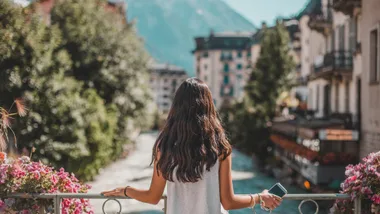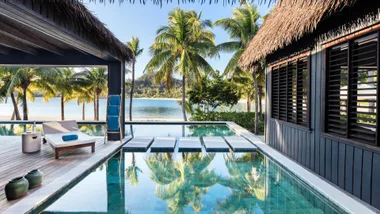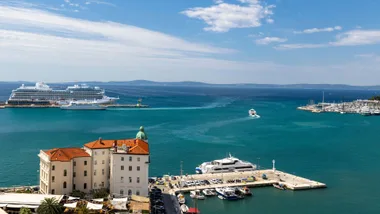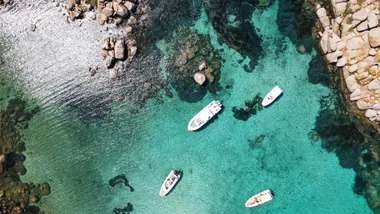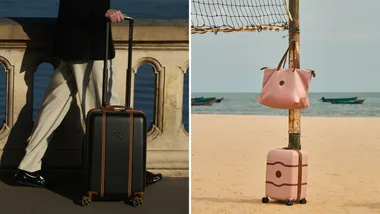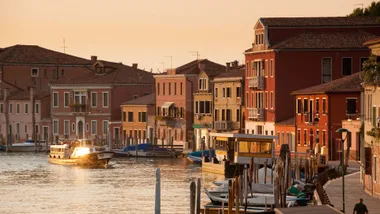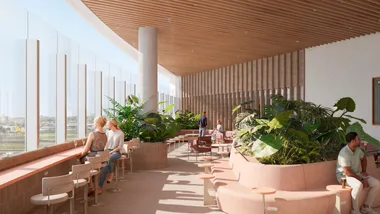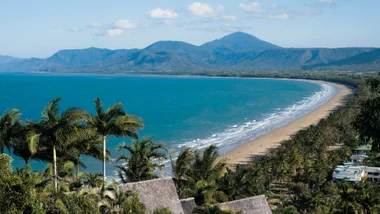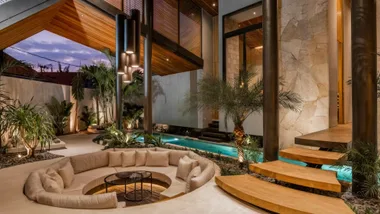THE FINE PRINT
Getting there
Singapore Airlines flies 21 times per week from Sydney, with four weekend connections to Istanbul. For further details, call 13 10 11 or visit www.singaporeair.com.au. Holiday packages are also available; call 1300 666 722 or visit www.siaholidays.com.au.
Stay
Radisson SAS
Çiragan Cad 46, Ortaköy, +90 212 310 1500, www.radissonsas.com. Rooms from about $300 per couple per night for standard; $760 for the junior suite.
Sumahan On The Water
Kuleli Cad no 51, Çengelköy, +90 216 422 8000, www.sumahan.com. Rooms from $370 per night for a deluxe room.
See
Sultanahmet
Home of Yerebatan Sarnici (Basilica Cistern), the Blue Mosque, Mehmet Pasa Mosque, Topkapi Palace, the Archeology Museum, Suleymaniye Mosque, the Grand Bazaar and the Egyptian spice market. Get a sunset or night view of the Golden Horn and illuminated sites of Sultanahmet from Mikla bar/restaurant at the Marmara Pera Hotel, Mesrutiyet Cad, +90 212 251 4646 or email.
Church of the Holy Saviour in Chora
Home to some of the world’s finest 14th-century Byzantine art. Kariye Camii Sok 26, Edirnekapi, +90 212 631 9241. Closed Wed.
Shop
A La Turca
Turkish antiques and lifestyle objects in a pretty, old house. Faikpasa No 4, Çukurcuma, +90 212 245 2933, www.alaturcahouse.com.
Sevan Biçakçi
Ornate Byzantine-inspired cufflinks and jewels. Gaza Sinapasa Sok, Kutlu Han 14/3, Cagaloglu. +90 212 520 4516/17, www.sevanbicakci.com.
Günes Öztarakçi
Beautiful selection of antique rugs and kilims. Mim Kemal Öke Cad 5, Nisantasi, +90 212 225 1954.
Sivasli Yazmacisi
Antique embroidered velvet fabric remnants. Yaglikçilar Cad 57 (inside the Grand Bazaar), +90 212 526 7748.
Elements
Divine modern kilims made to order. Valikonagi Cad Pr Orhan Ersek 2, Nisantasi, +90 212 231 5238.
Eat, drink and party
Sunset
Evening outdoor bar and terrace; good sushi, impeccable service. Adnan Saygun Cad Yol Sok 2, Ulus, +90 212 287 0357.
The atmospheric Sofyali Sokak (sokak means ‘street’ or ‘alley’) at night. Home to Refik restaurant and The House Café.
Lucca or Mangerie
Relaxed local diners for the beautiful Bebek boys and gals. Lucca, Cevdet Pasa Cad 51/B, Bebek, +90 212 257 1255; Mangerie, +90 212 263 5199.
Tuus
Outdoor lunch terrace at the newly opened Sofa Hotel. Tesvikiye Cad 123, Nisantasi, +90 212 224 8181, http://tuus.com.tr.
Markiz Patisserie
Fabulous old restored cafe with divine tiles. Markiz Pasaji, Istiklal Cad 360/109-110, Beyoglu, +90 212 245 8394.
Changa
Peter Gordon’s Asian-Med fusion eatery. Siraselviler Cad 87/1, Taksim, +90 212 249 1348, www.changa-istanbul.com.
Istanbul: the legendary capital of two of the world’s greatest empires, built on seven hills, spanning two continents, and witness to no less than 26 centuries of astonishing history. It’s had wars, intrigue, fabulous jewels and splendours beyond the dreams of most mortals, mystery, tragedy, myth and…Hakkasan.
The much-anticipated arrival of London’s glamorous China-diner smack in the middle of Old Constantinople (and ahead of whispered destination Hong Kong) heralds what the Euro party set have been keeping firmly in their Marc Marmel weekender bags for some time – Istanbul is hot, hot, hot.
Yes, it’s had as many names (Nova Roma, Constantinople, Byzantium) as Liz Taylor has had husbands. Yes, it snows in winter, and yes, the traffic problem sucks big time. Even so, Istanbul has been firmly touched with the hip-stick, so that now you can not only culture-vulch like you’re in Rome, but eat like you’re in Melbourne and party like you’re in Ibiza.
Today’s Istanbul, while still an exciting mix of East and West, is also a blend of old and brand-spanking new. This atmospheric, modern European city has it all – great nightlife, a vibrant food and fashion scene, and some pretty fabulous digs. Move over Paris and Rome…Istanbul is the place to be right now.
Nothing demonstrates this city’s get-ahead-cred more clearly than the rash of new slumber-lands dragging the hotel industry from threadbare to thread count. The run-of-the-mill chain choices of yesteryear have seriously smartened their acts with the arrival of the likes of the Radisson SAS. Its corner junior suites with Bosphorus views offer a chic, retro-mod escape complete with sexy hammam (Turkish bath) and free wi-fi throughout.
But it’s the boutique hotels that are really impressive. Across the river, A’jia and Sumahan on the Asian side offer the romance of renovated waterside properties, arrival by motor launch and all the fluffy-towelled, Corian chic you can sling a Jacobsen at.
On the European side, the newly opened Sofa Hotel in fashionable Nisantasi is slick, very spacious and wham bang in the centre of the action. Add a hydro/slimming spa and the seductive bar and restaurant Tuus, and you’ve got the local ladies queuing. Newest of all is Les Ottomans, a 12-suiter contemporary, opulent hang already packing in the style-set with its popular, salon-style Ottoman Club restaurant.
Planning where you stay is important in this city of often-crippling traffic. Getting from one district to another can take anything from 15 minutes to 90, depending seemingly on nothing at all. Arriving nearly an hour late at chic, heavingly packed Lucca doesn’t matter as they don’t take bookings anyway, but miss your table at Changa – consultant New Zealand chef Peter Gordon’s Asian-Med urban eatery, with its designer Eames chairs and tables – and you may not get another, at least in winter.
Istanbul is one of the few cities in the world with peripatetic establishments that move or close and sometimes change name depending on the season. Thus winter fave Lokanta goes from bricky bistro to packed-out summer rooftop Nu Teras; and knees-up party zone Cahide On 5, whose surprisingly good Turkish food is paired with a hysterically bad tranny show, becomes Cahide Safiye and goes alfresco Bali garden-esque at Demokrasi Park.
But the greatest change each summer is the arrival on the shores of the Bosphorus of the superclubs. Like vast party phoenixes, they rise each year from the ashes of the previous season with renewed vigour, often new names and always higher prices. Reina and Sortie are vast outdoor venues with scorching water views, containing not only potted collections of the city’s musical-chair restaurants and bars, but also seemingly the entire city’s population of seriously well-heeled youth, who turn out in droves at the weekends.
The young Turks are shameless show-offs and conspicuously display their wealth: flash cars, phones, jewels (Istanbul ladies worth their kokoreç never swim without all their diamonds), the latest labels and, of course, speedboats and yachts – the ultimate accessories.
But there are only so many premium alcohols you can slay before they slay you back. Check out the rows of Mercs and Jeeps lining up outside after-party comfort zone Sayan 24 for an early morning bowl of tripe soup with garlic (supposedly a great cure for hangover). Witness tiny Marmaris Büfe, a strip-light and lino 24-hour sandwich shop on Taksim Square, infamous for its divine smoked lamb tongue and kasar cheese toast.
But it’s not all party time. Fire up to the roof of the abjectly ordinary Marmara Pera Hotel and you’ll be greeted at Mikla with a good (not great) martini, an excellent international menu and a swoon-inducing view. Witnessing sunset over the Golden Horn as the iconic historic mosques of Sultanahmet light up like kids’ eyes at Christmas is, quite simply, mesmerising. Not good with heights? No worries; instead, pop on your kaftan for the open-air, oh-so-sexy Sunset. Think warm summer nights, glittering views and delectable Bospha-nova vibe.
Despite all the new venues and fusion explosions around the city, the quintessential Istanbul eating experience remains mezze (mixed starters) at a meyhane (taverna). The city is swamped with them, but those along bustling Nevizade Sokak, just behind the sweet Çiçek Pasaji (Flower Passage) on Istiklal Caddesi in Beyoglu, are authentic and incredibly lively. They all serve excellent fare; just point and pick. It’s worth noting that while raki (anise jet-fuel) is the traditional accompaniment to mezze, the very best way to enjoy it is to make someone else drink it. Likewise, if you crave to sample the local grape, be aware that the finest Turkish red wine equates at best to what one might call an acceptable quaffing wine and at worst something you might use to remove rust.
For equally great mezze but without the raucous add-on of Nevizade Sokak, beat a hasty retreat to nearby Boho chic-ster fave Refik. Sofyali Sokak, the fabulously atmospheric alley in which it resides, never fails to enthral with its film-set mix of crumbling brick, moss and lamplight. Nothing beats summer street-side dining, but even in winter, when the action retreats indoors, the atmosphere is still palpable.
And atmosphere is one thing that Istanbul has the global copyright to. The city is literally deluged in it, like the sugar-soaked pastries at tooth-numbing institution Saray Muhallebicisi, on Istiklal Caddesi, which has been serving up sweets and cakes since 1935. Descending into the vast sixth-century subterranean Yerebatan Sarniçi (‘Sunken Palace’) cistern in Sultanahmet, replete with its two giant Medusa heads and 336 nine-metre marble columns, is guaranteed to stay with you a while (shame on the authorities for allowing looped ‘atmos’ music). And while beholding the breathtakingly Byzantine mosaics at the Church of the Saint Saviour in Chora, it’s impossible to not be humbled by the history that has unfolded here.
But be warned, you don’t get this city to yourself, at least not in summer. Flit across the Golden Horn to Sultanahmet, the ground zero of historic sites, any given day in season and you’ll share it with swarms of tourists.
Which is not to say you shouldn’t go – you definitely should – but forgo that fourth martini at Mikla the night before and arrive on the dot at 9am. Sultanahmet is home to many of Istanbul’s most potent attractions, including the Topkapi Palace, the stunning Archeology Museum, Suleymaniye Mosque and the infamous Grand Bazaar and Egyptian spice market, but be aware you will be sharing these treasures with a few other people, and if that bugs you, then like for much of Europe, winter is far more suited to the reflective visitor.
Sultanahmet is also home to the Four Seasons hotel. Its roof terrace affords a neat respite from the sightseeing chaos as well as splendid views of the old town. The hotel’s restaurant, imaginatively entitled Seasons, puts on a fantastic Sunday brunch in the hotel garden. It’s useful to know that the Turks don’t go big on Sunday brunch – they do breakfast, which is exactly when you want to be at laid-back Bebek Kahve. This local den was, until recently, an old men’s café for coffee and backgammon, but the local cool-crew have taken it for their own, downing fresh orange juice, big frothy cappuccinos and delicious menemen (eggs scrambled with vegetables, often green capsicum, onions and tomatoes) at the little open-air tables with water views.
It is possible to enjoy a quieter, more spiritual sightseeing experience in summer, if you know where to look. Just five minutes’ walk from the frankly over-rated ‘must-see’ Blue Mosque is the much less-known little Sokullu Mehmet Pasa Camii, built by Mr. Mosque himself, Sinan, in 1572. It’s everything that your visit to the Blue Mosque should have been.
The sun, of course, doesn’t rise and set on Sultanahmet alone. This city is spangled with treasures, like the superb Sadberk Hanim Museum up the picturesque coast at Buyukdere; en route, be sure to stop for lunch at Muzedechanga, the glass-box sister to Changa, at the manuscript-rich Sakip Sabanci Museum. You’ve got pretty, village-like Ortaköy, home to relaxed waterfront House Café, and chic enclave Bebek, with its romantic little Bebek Hotel terrace right on the Bosphorus, plus hidden gem Mangerie. This scrubbed-floor, light and lovely Sydney-like café dishes up delicious modern twirls on Turkish ‘street food’ with great salads and sandwiches too.
The urban renewal at work in this city is exemplified by cute-as-a-button Çukurcuma. This district of winding streets, charmingly renovated houses and old apartment blocks is freckled with small retro, vintage and antique shops.
Nestled in Çukurcuma’s midst is the gorgeous A La Turca, a one-stop Ottoman lifestyle emporium stacked with stylish treasures and artefacts. The city is famous for its carpets and kilims, but running the gamut of the dealers at the Grand Bazaar is about as much fun as a cyst on your lip. What a joy then to find Günes Öztarakçi, renowned not only for her fine eye and superb collection of antique and contemporary carpets, but also for being the first female dealer in the city.
A saunter down Atiye Sokak in fashionable Nisantasi will bring you to the airy first-floor atelier of Zeynep Erol and her erotically delicate body jewellery. Across the road, goddess of Turk alternative fashion Gönül Paksoy’s elaborately simple, enhanced-ethnic jewels and organic silhouettes combine natural dyes and exquisite antique fabrics.
And it’s not just women who are welding the extra onto ordinary. Step up Sevan Biçakçi, the Sultan of boy-bling, whose huge rings and cufflinks based on Ottoman and Byzantine art and architecture are studded with pearls and semi-precious stones. Like many of the newly emerging style dictators in the city, Sevan gets it. He understands that – as the world’s cities swirl in a soup of ubiquitous high-street luxury labels, celebrity chefs and their multiple headline restaurants – for the modern traveller, more than ever before, it’s the unique local artisans, cooks and craftspeople who protect and define the city.
Istanbul is bolder and brighter and more beautiful than ever. Does it need Hakkasan? Of course not. But does it want Hakkasan? Hell, yes. Party on.
Grant Thatcher is the publishing editor of the LUXE City Guides. LUXE Istanbul, Paris and Madrid have just been released. For more information, visit www.luxecityguides.com.
 christopher wise
christopher wise
